Abstract - PreventionWeb
advertisement
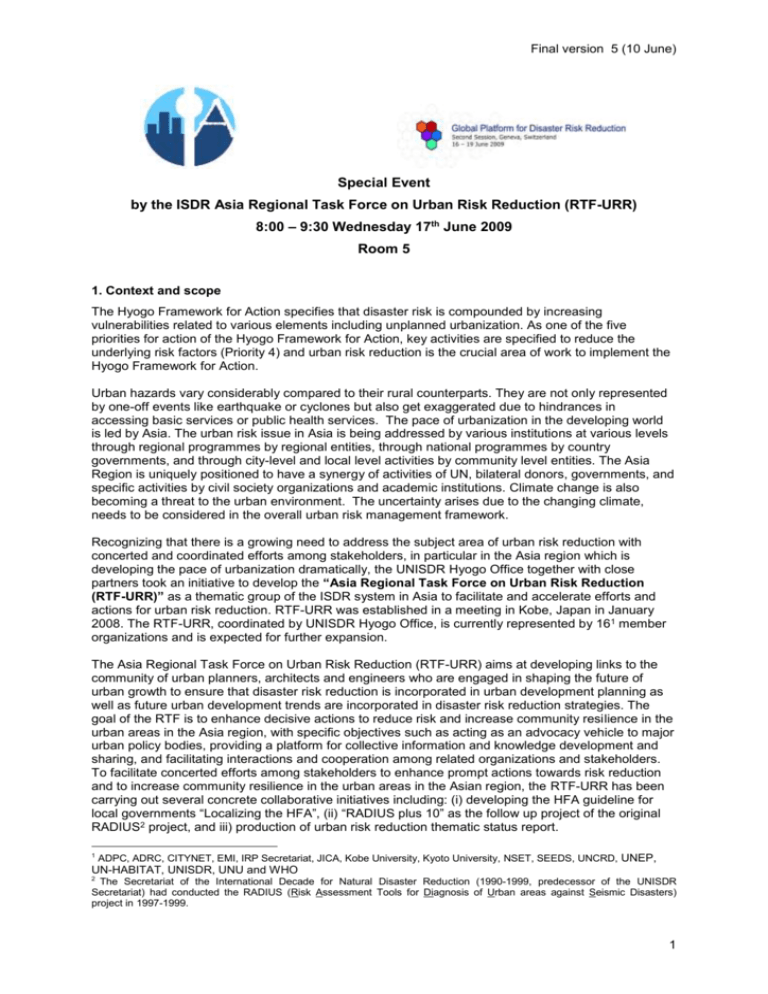
Final version 5 (10 June) Special Event by the ISDR Asia Regional Task Force on Urban Risk Reduction (RTF-URR) 8:00 – 9:30 Wednesday 17th June 2009 Room 5 1. Context and scope The Hyogo Framework for Action specifies that disaster risk is compounded by increasing vulnerabilities related to various elements including unplanned urbanization. As one of the five priorities for action of the Hyogo Framework for Action, key activities are specified to reduce the underlying risk factors (Priority 4) and urban risk reduction is the crucial area of work to implement the Hyogo Framework for Action. Urban hazards vary considerably compared to their rural counterparts. They are not only represented by one-off events like earthquake or cyclones but also get exaggerated due to hindrances in accessing basic services or public health services. The pace of urbanization in the developing world is led by Asia. The urban risk issue in Asia is being addressed by various institutions at various levels through regional programmes by regional entities, through national programmes by country governments, and through city-level and local level activities by community level entities. The Asia Region is uniquely positioned to have a synergy of activities of UN, bilateral donors, governments, and specific activities by civil society organizations and academic institutions. Climate change is also becoming a threat to the urban environment. The uncertainty arises due to the changing climate, needs to be considered in the overall urban risk management framework. Recognizing that there is a growing need to address the subject area of urban risk reduction with concerted and coordinated efforts among stakeholders, in particular in the Asia region which is developing the pace of urbanization dramatically, the UNISDR Hyogo Office together with close partners took an initiative to develop the “Asia Regional Task Force on Urban Risk Reduction (RTF-URR)” as a thematic group of the ISDR system in Asia to facilitate and accelerate efforts and actions for urban risk reduction. RTF-URR was established in a meeting in Kobe, Japan in January 2008. The RTF-URR, coordinated by UNISDR Hyogo Office, is currently represented by 161 member organizations and is expected for further expansion. The Asia Regional Task Force on Urban Risk Reduction (RTF-URR) aims at developing links to the community of urban planners, architects and engineers who are engaged in shaping the future of urban growth to ensure that disaster risk reduction is incorporated in urban development planning as well as future urban development trends are incorporated in disaster risk reduction strategies. The goal of the RTF is to enhance decisive actions to reduce risk and increase community resilience in the urban areas in the Asia region, with specific objectives such as acting as an advocacy vehicle to major urban policy bodies, providing a platform for collective information and knowledge development and sharing, and facilitating interactions and cooperation among related organizations and stakeholders. To facilitate concerted efforts among stakeholders to enhance prompt actions towards risk reduction and to increase community resilience in the urban areas in the Asian region, the RTF-URR has been carrying out several concrete collaborative initiatives including: (i) developing the HFA guideline for local governments “Localizing the HFA”, (ii) “RADIUS plus 10” as the follow up project of the original RADIUS2 project, and iii) production of urban risk reduction thematic status report. 1 ADPC, ADRC, CITYNET, EMI, IRP Secretariat, JICA, Kobe University, Kyoto University, NSET, SEEDS, UNCRD, UNEP, UN-HABITAT, UNISDR, UNU and WHO 2 The Secretariat of the International Decade for Natural Disaster Reduction (1990-1999, predecessor of the UNISDR Secretariat) had conducted the RADIUS (Risk Assessment Tools for Diagnosis of Urban areas against Seismic Disasters) project in 1997-1999. 1 Final version 5 (10 June) This special event on urban risk reduction will be organized by RTF-URR together with various partner organizations to review the current status and update on-going initiatives on urban risk reduction in Asia, and also to discuss on how to contribute to the ISDR Global Campaign on Urban Risk Reduction. 2. Expected results and links to GP09 outcomes This side event will: Review the current status and update on-going initiatives on urban risk reduction in Asia, including the production of the guideline for localizing HFA. Identify the main challenges, needs and opportunities in the area of urban risk reduction Discuss and receive feedbacks from wider community on on-going initiatives under the RTF-URR Share expectation and discuss on how to contribute to the ISDR Global Campaign on Urban Risk Reduction Come up with suggestions and ideas on initiatives (flagship projects) as concerted efforts to promote urban risk reduction agenda in the context of the ISDR Global Campaign on URR. This event will support all the following four objectives of the GP09 Assess progress made in the implementation of the HFA Enhance awareness of disaster risk reduction Share experience and learn from good practice Identify remaining gaps as well as actions to accelerate national and local implementation of the HFA And also this event will promote the link to climate change adaptation in relation to disaster risk reduction and HFA implementation. In particular, the initiative called ‘City Profile: Climate and Disaster Resilience’ based on the methodology called CDRI (Climate Disaster Resilience Index) is going to be presented in the event for that purpose. 3. List of partners involved This is a side event organized by the ISDR thematic regional platform “Asia Regional Task Force on Urban Risk Reduction (RTF-URR)” coordinated by the UNISDR Hyogo Office together with the members of the RTF-URR. RTF-URR members are: ADPC, ADRC, CITYNET, EMI, IRP Secretariat, JICA, Kobe University, Kyoto University, NSET, SEEDS, UNCRD, UNEP, UN-HABITAT, UNISDR, UNU and WHO) 4. Format of the side event and list of presentations The side event will have several presentations (mentioned below) and exchanges, followed by moderated discussion on how to contribute to the next biennium ISDR Global Campaign 2010-2011 (the theme is urban risk reduction). Other panel members, aside from the main speakers, will be invited to stimulate discussions and serve as resource persons. The chairperson (Prof. Rajib Shaw, Chair of the RTF-URR) together with the UNISDR Hyogo Office (Ms. Yuki Matsuoka) will present an overview and facilitate discussions. Chair: Prof. Rajib Shaw (Kyoto University), the Chair of the RTF-URR Moderator/Coordinator: Ms. Yuki Matsuoka, UNISDR, the Coordinator of the RTF-URR 2 Final version 5 (10 June) Programme (1) Presentation by RTF-URR partners on their initiatives (5 minutes each) Prof. Yasuo Tanaka, Kobe University on “Plan for Professional Certificate Programme for Urban Disaster Risk Management Specialist” Mr. Shoichi Ando, UNCRD, on “Community based approach DRR in urban areas” Mr. Loy Rego, ADPC, on “ADPC’s activities contributing to urban risk reduction” Prof. Hiroyuki Kameda, Earth Science and Disaster Prevention (NIED) Earthquake Disaster Mitigation Center (EDM) on “Disaster Reduction Hyperbase (DRH) project” (2) Ms. Yuki Matsuoka, UNISDR Hyogo Office (20 minutes) Overview of the Asia Regional Task Force on Urban Risk Reduction and on-going initiatives including the joint publication ‘City Profile: Climate and Disaster Resilience’ based on the CDRI methodology (Climate Disaster Resilience Index) and guideline for localizing the HFA” (3) Mr. Manu Gupta, SEEDS ASIA (10 minutes) Thematic analysis and status report on urban risk reduction in Asia (4) Ms. Etsuko Tsunozaki, Vice Chair of the RTF-URR, SEEDS Asia (10 minutes) RADIUS plus 10 project (5) Discussion towards ISDR Global Campaign on Urban Risk Reduction 2010-2011 (25 minutes) Mr. Fouad Bendimerad, EMI, on expectation to the ISDR Global Campaign on URR Mr. Rajib Shaw, Chair, will moderate discussions and wrap up. Concluding remarks and policy implications It is important to recognize that there are existing significant initiatives in the area of urban risk reduction. We need to make these initiatives and existing tools more available to needed governments and actors and need to contribute to creating an enabling environment of risk reduction in urban areas, and to enhance the resilience of people and communities. The tone of the campaign should be “our work on URR should be expanded and scaled up, while recognizing existing useful and significant initiatives”. Elements of needs and value added are to bring new partners and to facilitate city resilience, to make DRR as city priority, build/strengthen city (major) network, and fostering ownership. Needless to say that Urban Campaign will not solve all the problems in the urban areas. The Urban Campaign aims at creating an enabling environment of risk reduction in urban areas, and to enhance the resilience of people and communities. In this context, the general consensus among the RTFURR members is to play a leading role to facilitate and drive the ISDR Global Campaign on Urban Risk Reduction in Asia. As suggestion from RTF-URR, objectives of Urban Campaign (2010-2011) should include: To promote and implement concept of resilient urban resilience in 21st century To enhance the awareness about urban risk among different stakeholders, including urban leaders and communities To enhance decision actions to reduce the urban risk in a sustainable way Urban campaign should be composed of a process and development of products on urban risk reduction. Process includes participation of different stakeholders in advocacy, projects, and education. Products will include tools, guidelines, trained personnel and professionals, and creating an enabling environment of urban risk reduction. During these two years, there would be series of events, projects and products. The key issue of urban campaign is to promote the Action Agenda, and to enhance sustainable resilient practices within different types of urban areas, including small, medium sized and mega cities. 3 Final version 5 (10 June) Expected Outcome Awareness raising on urban risk reduction agenda. Sharing current status and main challenges. Sharing on-going initiatives to further promote concerted efforts and collaborative activities among partners working in this area of urban risk reduction. Receiving feedback to on-going initiatives from wider community, in particular on the draft consultative version of the guideline of “Localizing HFA”. Common understanding and expectation on the ISDR Global Campaign on URR to enhance the enabling environment of risk reduction in urban areas. The Hyogo Framework for Action (HFA) and Words into Action need to reach to the local government and needs to be implemented in the urban areas. Some concrete suggestions and ideas on initiatives (flagship projects) as concerted efforts to promote urban risk reduction agenda in the context of the ISDR Global Campaign on URR. Specific possible activities in the context of the urban campaign will be identified through the discussion, which could include following areas: Advocacy: Awareness raising to people, communities and decision makers Forum and Events: Workshops, Conferences, Public Forum on specific issues of urban risk reduction Flagship Projects: Demonstrative projects on specific geographic and thematic locations Tools and Guidelines: Development and implementation of Higher Education: Specific courses and diploma programs related to higher education in the related field 5. Supporting documents Flyer Asia Regional Task Force on Urban Risk Reduction (RTF-URR) Publication ‘City Profile: Climate and Disaster Resilience’ (launched in February 2009). This publication was jointly produced by the Kyoto University, CITYNET, and UNISDR. Draft consultation version of the Guideline “Localizing the Hyogo Framework for Action” Urban Risk Reduction Thematic Status Report in Asia Input paper from the Asia Regional Task Force on Urban Risk Reduction towards the ISDR Global Campaign on Urban Risk Reduction (2010-2011) Contact person Prof. Rajib Shaw, Kyoto University (shaw@global.mbox.media.kyoto-u.ac.jp) Ms. Yuki Matsuoka, UNISDR Hyogo Office (matsuoka@un.org) 4
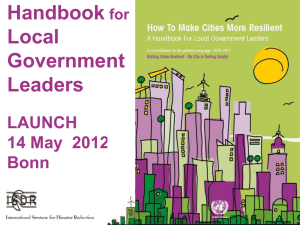
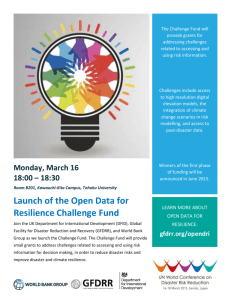
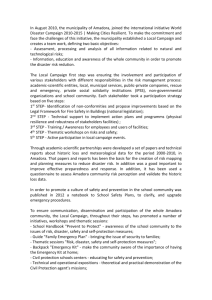
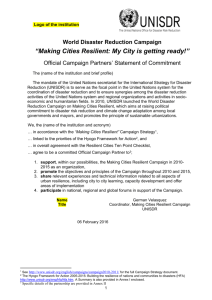
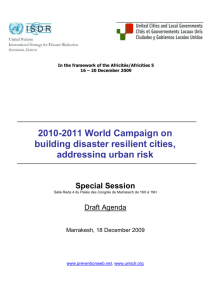
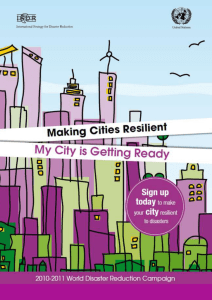

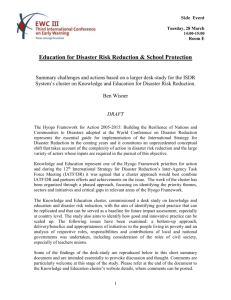
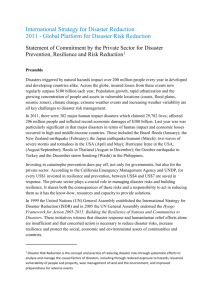
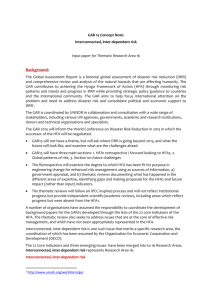
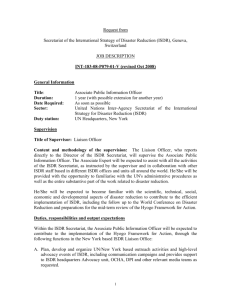
![View full document in MS Word [DOC 771.58 kB]](http://s3.studylib.net/store/data/008979785_1-d2d6083eee189241d47a40e00f6f217f-300x300.png)